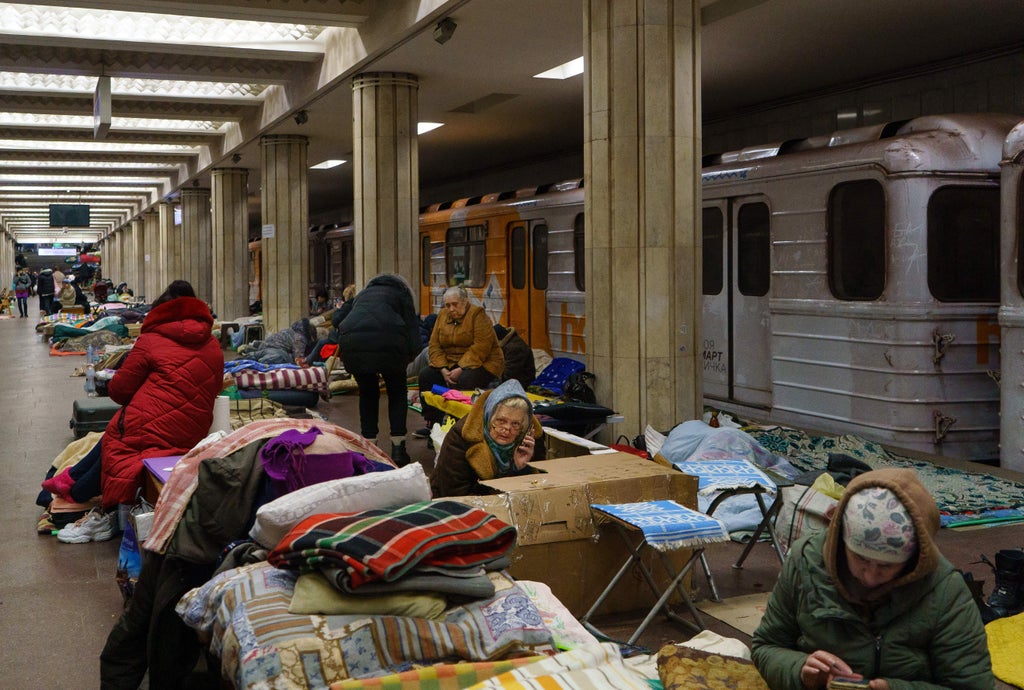
There are two Saltivkas. One is above ground, an area containing row after row of broken buildings and charred cars on roads cratered by bombs, solitary figures hurrying along, and frightened faces peering out of windows amid the sound of explosions.
There is another Saltivka, though, comprising hundreds of people who used to live there and are now transplanted underground, huddled together in metro stations, anxious about whether the homes they left behind have survived the daily barrage of missile strikes and artillery rounds.
Saltivka is the most heavily bombed district of one of the most extensively bombed cities in the war so far, Kharkiv.
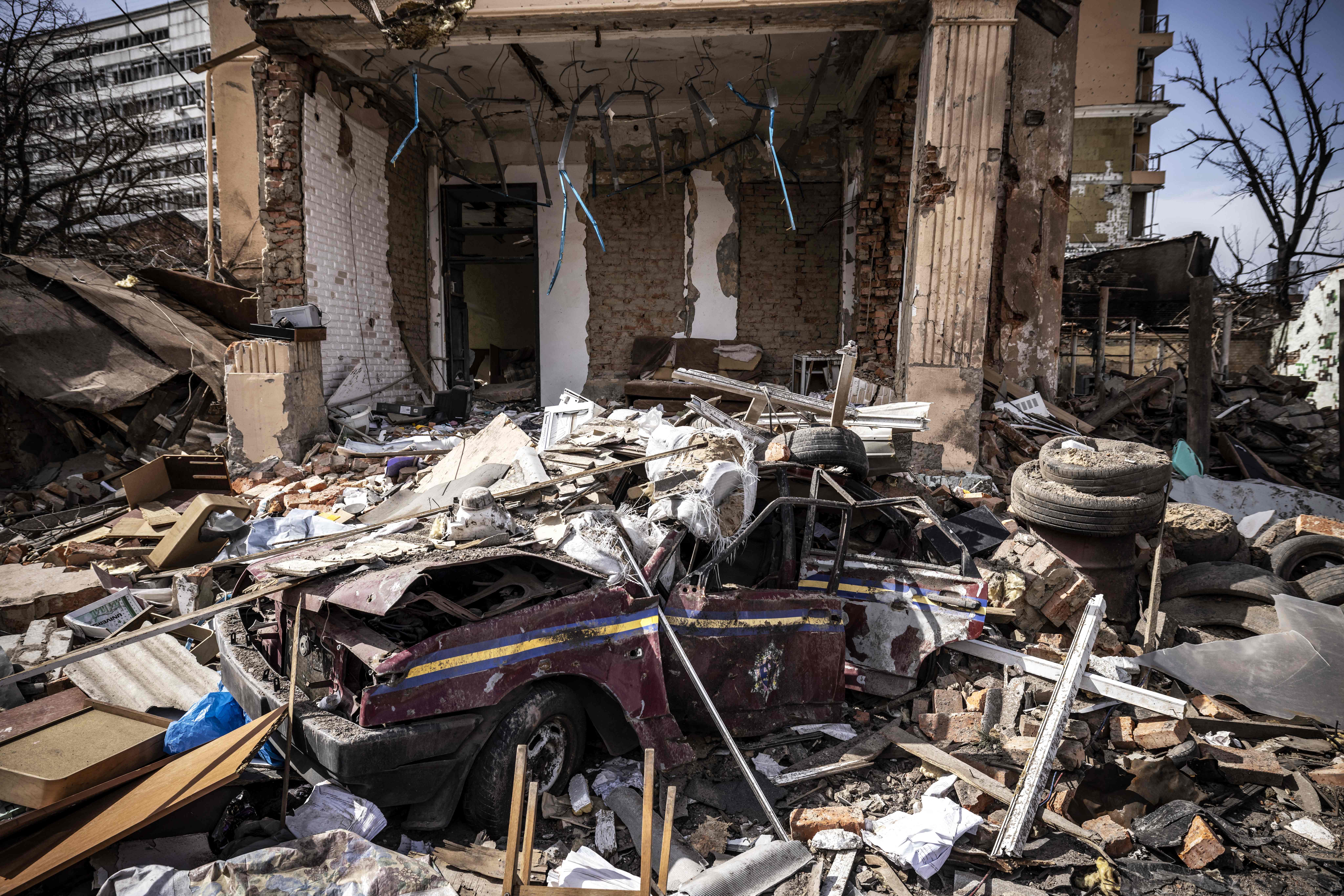
Ukraine’s second city has yet to experience the withdrawal of Russian forces, as has happened around the capital, Kyiv. Here the onslaught has continued as the Kremlin attempts to block off the Donbas, which lies to the east of the city.
Ukrainian troops have made hard-fought gains in the villages and towns around Kharkiv, but Vladimir Putin’s forces remain within close enough range to carry out salvos of lethal strikes, often indiscriminately, into residential areas, taking a rising toll of lives.
Residents in some parts of Saltivka are among the most economically deprived in Kharkiv, often either unemployed or without regular work. Many of them do not have the identification documents necessary to receive government emergency support, let alone passports to get out of the country to escape the war.
Oleksandr Pavluyk has been going through abandoned homes on a run-down estate to try to find left-behind food for his elderly mother and himself. He shows what he has managed to find after an hour and a half of foraging – two loaves of stale, crumbling bread, two onions, four potatoes, three mouldy apples, and a can of salmon.
“Most people who live here did not have a lot anyway, so I wasn’t expecting much,” he tells The Independent. “We haven’t had electricity for days, so food in the fridges has rotted. But the salmon is good, my mother would like that, it would be a luxury. It would be nice to give her something good at a time like this. I’ve stayed out here because of her – she does not want to leave – but life is hard for her, for us.”
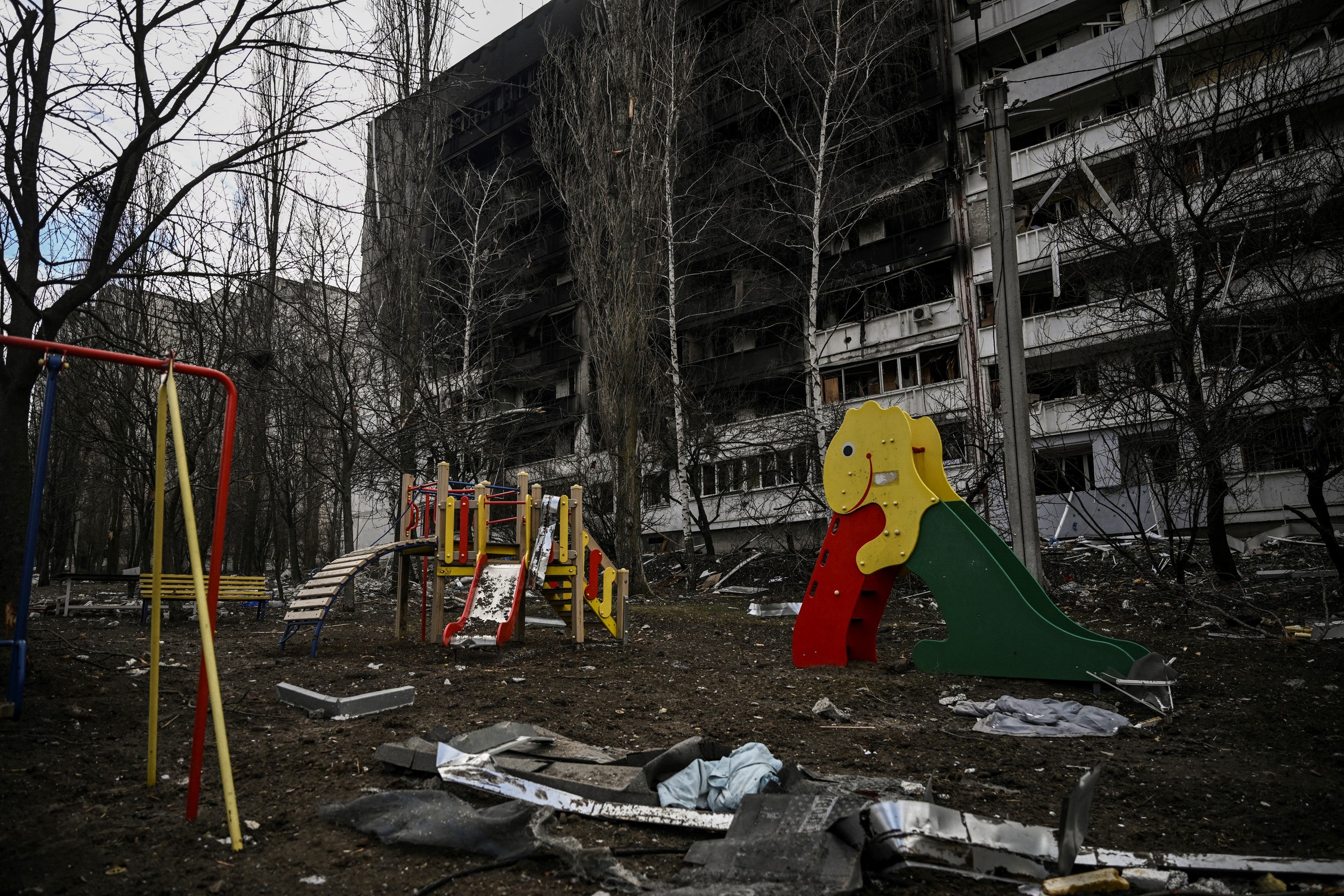
Mr Pavluyk says he tried to persuade his 73-year-old mother, Yulia, that they should go somewhere safer, stressing that it was far too dangerous to stay on, but failed to change her mind.
There are sounds of blasts as the 42-year-old building worker, who had not worked for five months even before the war started, describes their desperate predicament.
“Maybe they are trying to hit a [Ukrainian] army post which was there. That moved a while ago, but they still keep bombing this area. We have also had these buildings hit directly, and these are just people’s homes”, he says, pointing at blasted walls, balconies sheared off and shattered windows.
“This happens a lot, I don’t know why. Most people have gone away. There aren’t many left to kill here.”
Kharkiv is only 25 miles from Russia, and this stretch of Saltivka is one of the points closest to the border. “It is not far for them to bomb,” says Denis Zhuravlov, standing outside another apartment block. “We have not seen any real reduction of the attacks since these peace talks started. They stop for a few hours and then start again.”
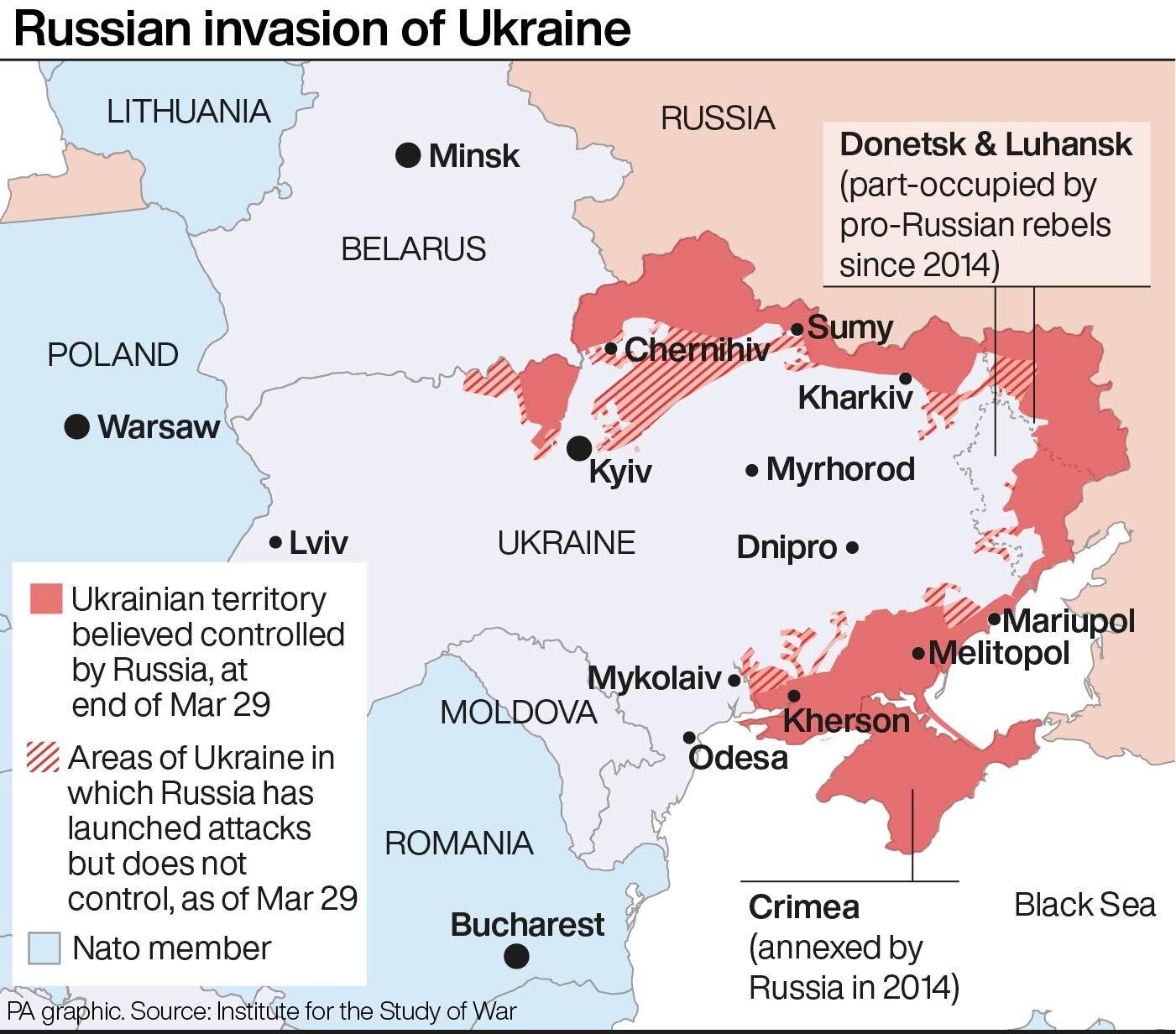
Mr Zhuravlov wants to talk about the “new types” of bombs being used by the Russians.
“They burst in the air, and then float down and burst again at low level,” he says, pointing towards pieces of orange cloth hanging from branches. “They have been using all kinds of weapons here. People are frightened to be out; that is why they went from here. Our neighbours went to stay at the train stations, a lot of people have from here.”
The move to seek shelter at the metro stations began on the first day of the invasion, 24 February. Hostilities began in Kharkiv with sustained missile attacks. Oksana Kovaleva’s apartment block was hit within 45 minutes of the first attack. She grabbed her four-year-old daughter Iryna and her son, Yuri, threw on a coat, and rushed out of the building.
Another family was fleeing by car and stopped to take Ms Kovaleva and her children to one of the nearest metro stations, where the vehicle was abandoned and they all rushed underground.
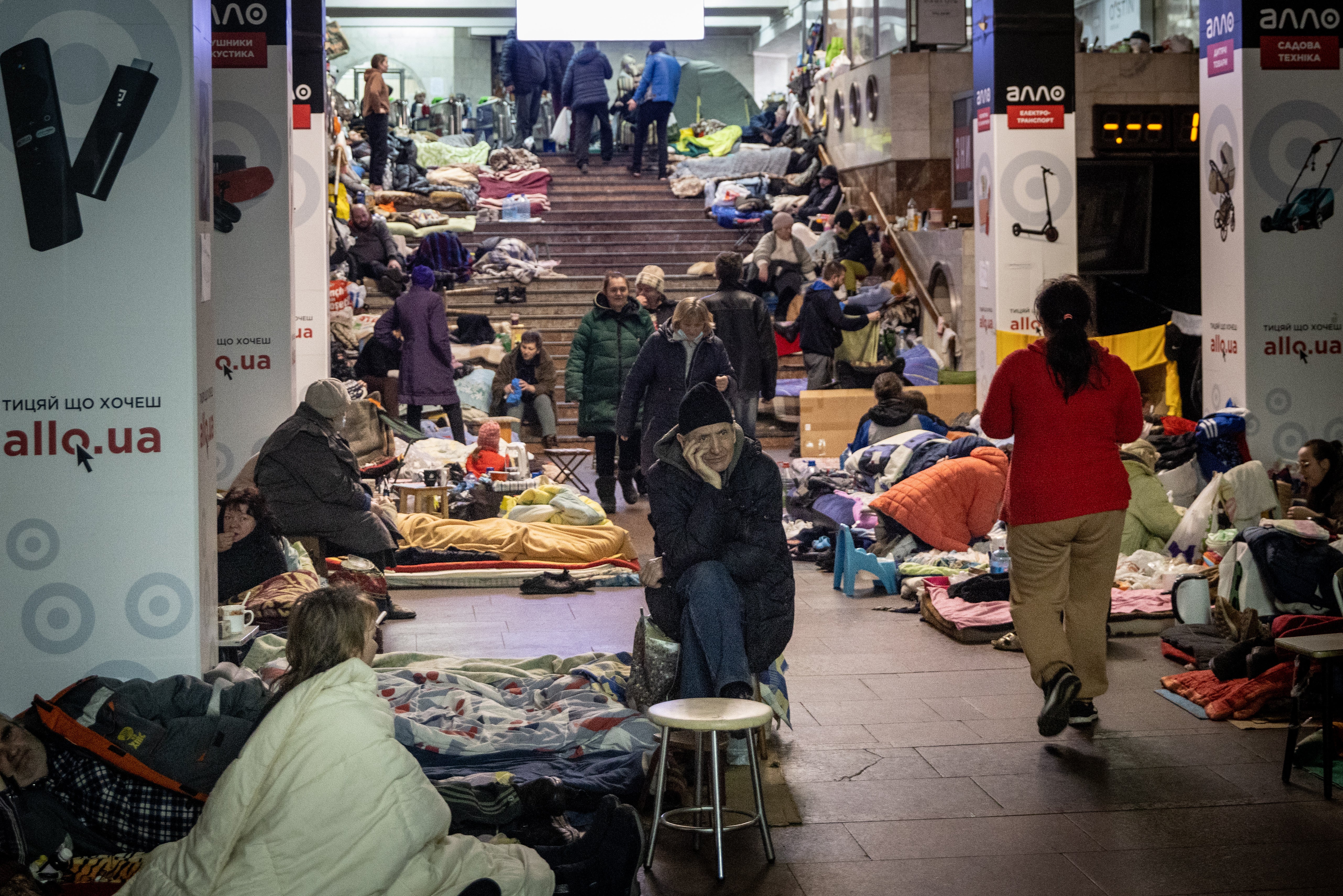
“Soon there were more and more people coming in. Everyone was terrified – the explosions were so loud that we could even hear them underground,” she says. “I was not thinking about our apartment at the time. We were just very grateful that we were alive, my kids were all right. It was relief more than anything else.”
Ms Kovaleva’s husband, Anton, had joined a volunteer battalion of the Ukrainian forces, which had deployed to the front line east of the city. “I knew he’d be very worried about us; I tried calling him many times that night. I got through to his brother the next day, and he passed on the message that we were safe,” she recalls.
After three days, Ms Kovaleva and her neighbour went back to their respective homes to collect essential items and their pets: a dog and two cats. They returned to the Heroiv Pratsi metro station, where they have been living ever since, sleeping in tents on the platform and seldom venturing out.
Over time, a degree of structure has been established in the subterranean community. A medical clinic has been set up, food is provided by welfare groups and religious organisations, and there are online lessons for children. There is even a makeshift nail parlour. The tracks, with trains no longer running, are used to walk from station to station by those seeking places to stay.
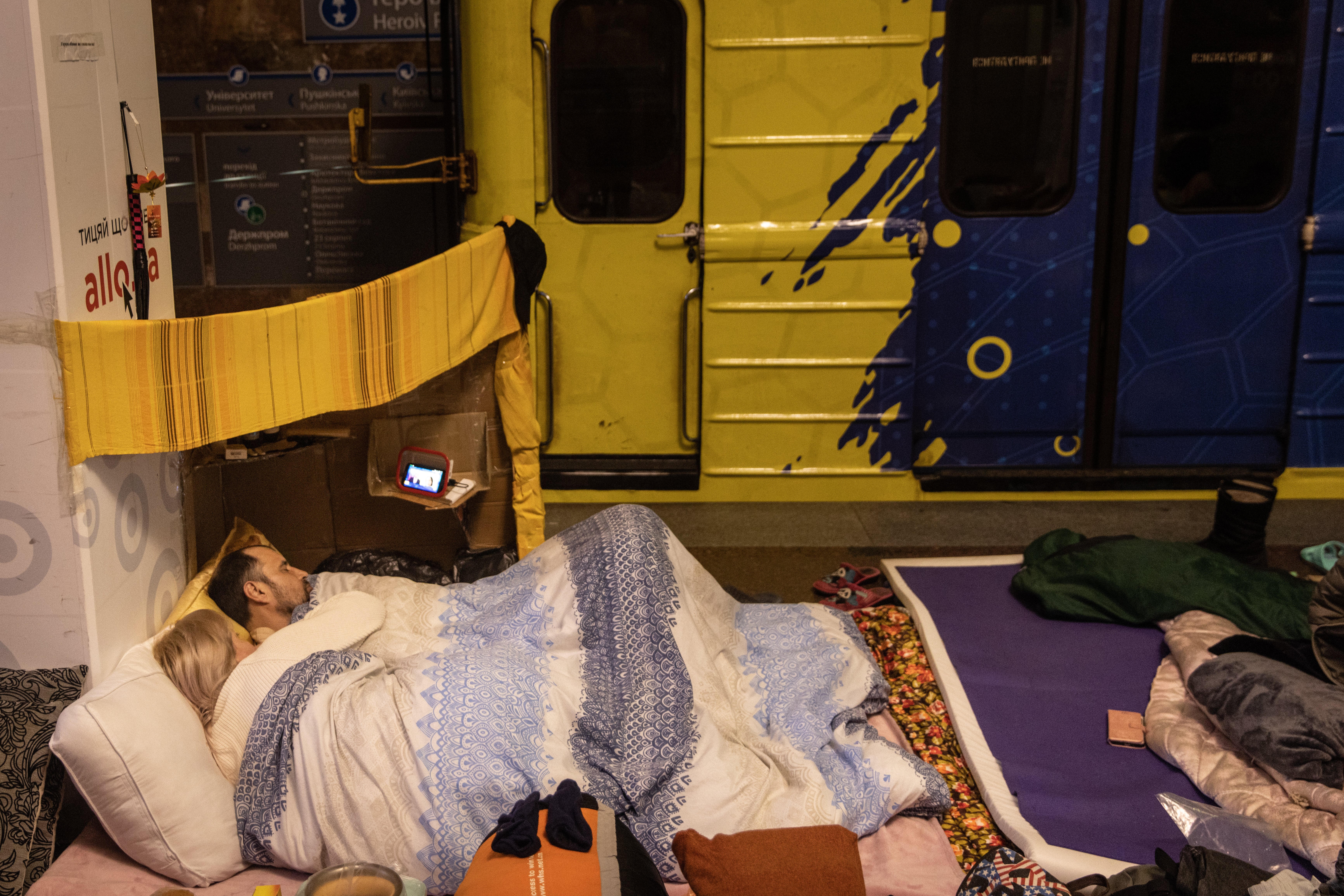
Danger, however, is never far away. A supermarket near Heroiv Pratsi was struck by a missile recently, injuring eight people and killing three others who were queueing for food, one of them a woman who had been sheltering in the station.
Anastasia Kharkova, an activist staying at the station, describes the attempts to introduce a semblance of normality to the community, which exists in such proximity to the violence above ground.
“It was decided early on that this war could go on for a very long time, and all efforts must be made to make life work down here. A lot of people volunteered – people came out of retirement to help. The authorities did the best they could, I think,” she says. “There has also been a lot of help from the churches and people of different faiths; we are all very grateful for that.”
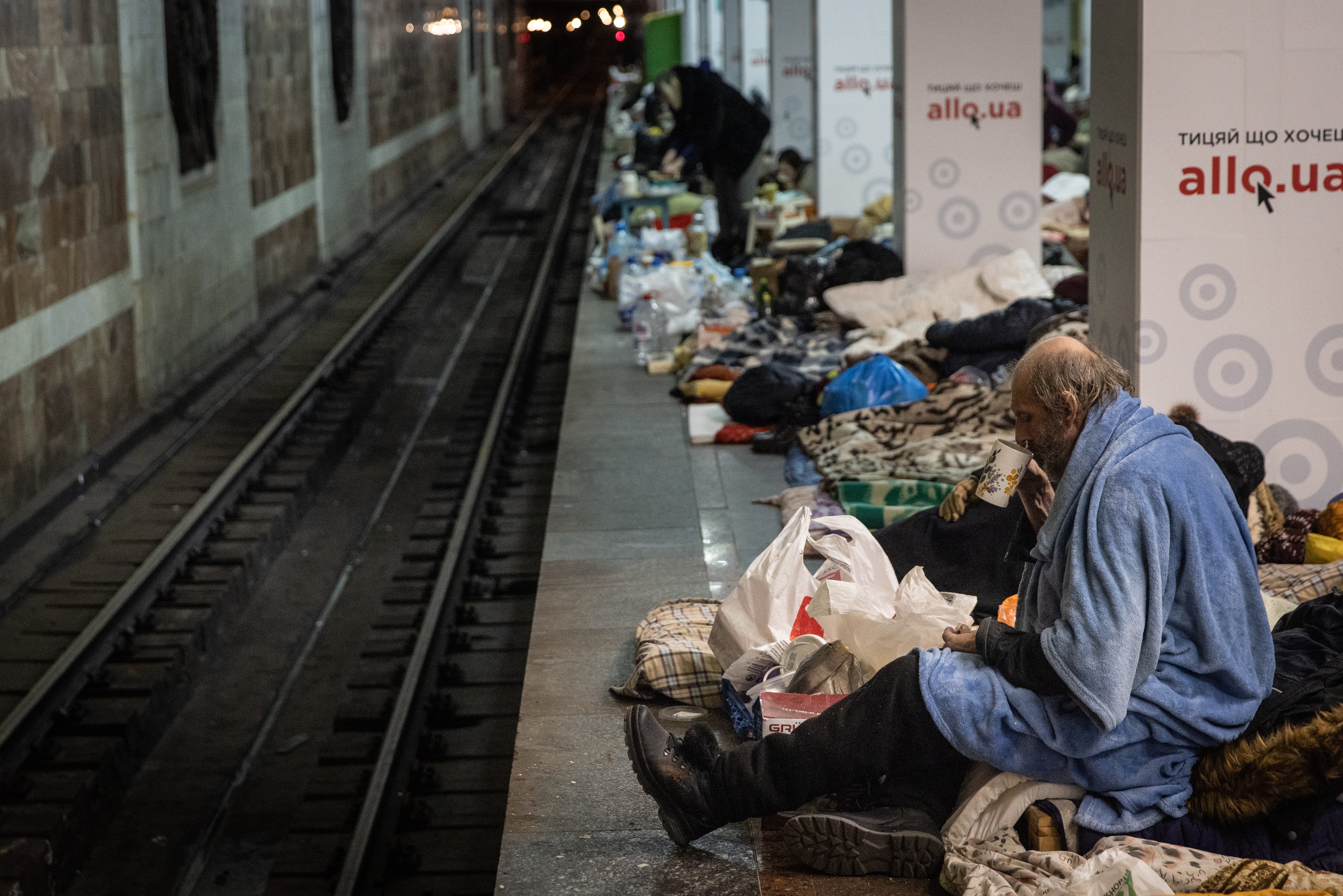
A group from a Hare Krishna temple comes with soup, bread and sweets to provide lunch. Yesterday it was the turn of a Baptist church. “We are all working together, doing what we can,” says one of the Hare Krishna followers. “We don’t discuss religion; we are just helping each other out,” he adds, as his companions chant with cymbals and drums.
Lubov Mimilova, a social worker, has been setting up playgroups for families in the stations. There are drawings by children on the walls, games and parties organised. “What is happening is obviously having a deep impact on these boys and girls,” she says. “Letting them express their feelings is important, but it is also very important to let them hold on to their childhood as much as possible under the circumstances.”
There is a queue at platform 2 for Viktoria Gondarova, a beautician offering nail polishing. “Everyone wants to help. This is what I do in my working life, and so I thought, why not offer this service? This will be something which will remind women of their life before the war, cheer them up a bit,” she says. “Everyone needs cheering up at a time like this.”

There are mental as well as physical issues to deal with for Elena Doro, a doctor at one of the city’s hospitals, who has set up a part-time surgery in what used to be the ticket office.
“We have had the usual illness at this station – coughs and colds, a few accidents with people falling, especially when they have been trying to get to the shelter in a rush because of the bombing,” she says. “There have also been two cases of Covid; it became pretty obvious that they had it when they arrived, and they were sent for treatment.
“But there are also psychological issues, of course, as one would expect from people being in this situation. One thing we have noticed is that some people have become afraid of open spaces, not being near others in an enclosed area. This is something which will need to be addressed when things get better.”

There are those on the platforms of Heroiv Pratsi who are convinced that things will start to get better.
“We are turning back the enemy: Kharkiv hasn’t been captured. Vladimir Putin has failed to conquer our country,” Nicolai Shevchenko says. “Staying down here has been distressing for us, but we have survived and we’ll be strong when we get out.
“Ukraine has suffered a lot of losses, a lot of pain, but our country is united. We will be stronger after what has happened, we have no doubt about that.”
The Independent has a proud history of campaigning for the rights of the most vulnerable, and we first ran our Refugees Welcome campaign during the war in Syria in 2015. Now, as we renew our campaign and launch this petition in the wake of the unfolding Ukrainian crisis, we are calling on the government to go further and faster to ensure help is delivered. To find out more about our Refugees Welcome campaign, click here. To sign the petition click here. If you would like to donate then please click here for our GoFundMe page.







